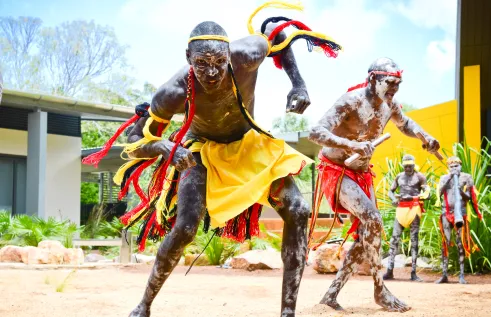Update your personalisation settings to view information about this course.
This course is only available to Domestic students and your preference is currently set to International.
This course is only available to International students and your preference is currently set to Domestic.
Key details
Duration
Locations
Entry requirements
View full entry requirementsCredit points required
80Course code
Overview
The Diploma of Indigenous Research is exclusively for Indigenous students. You will draw on your own knowledge, heritage and cultural traditions to carry out on-ground research work and learn how research may contribute in positive ways to Indigenous people, places and futures.
If you are new to research, you will gain an introduction to key issues and themes, and develop practical skills informed by the place where you live and its law and knowledge.
If you are already exploring your own research projects, you will gain supervision and support, and meet other students exploring their own projects in other places.
If you are an experienced researcher, you will demonstrate this and be recognised for the skills and practices that are important in your workplace or community.
This course includes an on-ground research project where you will be supported to develop your own research work in urban or remote Aboriginal communities. All units in the course are available online and can be carried out in the places where you live and work.
Career opportunities
You will graduate with the knowledge and skills that are useful for research within Aboriginal and Torres Strait Islander contexts, organisations and communities, government departments and agencies or private agencies and organisations that are involved in Indigenous research. The course seeks to credential the Indigenous research knowledge and skills you already have and helps you apply it in other research settings.
Credit transfers and advanced standing
Credit transfer
For further information on credit transfer and how to apply visit ASK CDU
Credit transfers and advanced standing
Credit transfer
For further information on credit transfer and how to apply visit ASK CDU
Fees
Commonwealth supported places
Commonwealth Supported places are available in this course to students who meet one of the following residency requirements:
(a) be an Australian citizen, who will complete some of your course of study while resident in Australia; or
(b) a New Zealand citizen; or an Australian permanent visa holder; or an eligible former permanent humanitarian visa holder; who studies the entire course while living in Australia.
Further information about fees and charges can be found at Fees and Payments.

Why study Indigenous knowledges at CDU?
Study Indigenous knowledges at CDU to ensure the advancement and preservation of Indigenous knowledge systems. We're uniquely positioned to offer learnings from cultural experts so you can make change through careers in Indigenous policy, advocacy, research, or more.
- Relevant to Indigenous and non-Indigenous students
- Strong relationships with Indigenous community groups
- Choose to study online, on campus, part-time or full-time as it suits you

Why study an undergraduate course at CDU?
Study an undergraduate course at Charles Darwin University to turn your passion into a profession. Choose from hundreds of certificates, diplomas and degrees and enjoy a flexible, supportive learning environment. Whatever you're interested in, there's a place for you at CDU.
- Top 100 university globally for quality education (THE Impact Rankings 2021)
- Five-star Australian university for graduate employment outcomes (GUG 2024)

Why study Indigenous knowledges at CDU?
Study Indigenous knowledges at CDU to ensure the advancement and preservation of Indigenous knowledge systems. We're uniquely positioned to offer learnings from cultural experts so you can make change through careers in Indigenous policy, advocacy, research, or more.
- Relevant to Indigenous and non-Indigenous students
- Strong relationships with Indigenous community groups
- Choose to study online, on campus, part-time or full-time as it suits you

Why study an undergraduate course at CDU?
Study an undergraduate course at Charles Darwin University to turn your passion into a profession. Choose from hundreds of certificates, diplomas and degrees and enjoy a flexible, supportive learning environment. Whatever you're interested in, there's a place for you at CDU.
- Top 100 university globally for quality education (THE Impact Rankings 2021)
- Five-star Australian university for graduate employment outcomes (GUG 2024)
What will I study?
The course requires the successful completion of 80 credit points of study. Fifty (50) credit points of core units provide an opportunity for the formalisation and recognition of Indigenous knowledge traditions and an orientation and cultural foundation to the ways in which knowledge is recorded and transmitted within the University. Thirty (30) credit points of electives allows students an element of diversity in their studies, an ability to explore an area of specific interest, or to continue with research work of value to their own knowledge community.
Course structure
A candidate must successfully complete units totalling 80 credit points (cp) as detailed below. All units are valued at 10 credit points unless otherwise indicated.
| Unit type | Credit Points | Specific requirements |
| Core Units (5 units) | 50cp | Compulsory Core units totalling 50 credit points as detailed below. IND170 Indigenous Research: Guiding Principles |
| Specialist Electives (2 units) | 20cp | Specialist Elective units totalling 20 credit points as detailed below. IAS131 Colonising Australia |
| Electives (1 unit) | 10cp | Units totalling 10 credit points selected from undergraduate units offered by the University. |
| 80cp | Total Credit Points |
Course Rules (unless otherwise indicated in the above course structure)
- See the Higher Education Course Rules (Award Requirements) in the Units and Courses Policy.
COURSE CHANGES AND TRANSITIONAL ARRANGEMENTS - 2023
CUC100 removed from the course. Students that completed this unit prior to 2023 may count CUC100 towards the elective.
ATI110 removed from the course. Students that completed this unit prior to 2023 may count ATI110 towards the elective or discuss with the course coordinator a suitable replacement unit.
ATI230 removed from the course. Students that completed this unit prior to 2023 may count ATI230 towards the elective or discuss with the course coordinator a suitable replacement unit.
IND200 is replaced by IAS201.
IND130 is replaced by IAS142.
INR200 is replaced by IAS322.
IND230 is replaced by IAS252.
CIK210 is replaced by IAS223.
Study plan
STUDENTS COMMENCING IN SEMESTER 1
The Recommended Study Plan provided below is suitable for a student enrolling in a full-time study load. Students entering this course with advanced standing, or wishing to vary their study plan due to work, personal, financial or other reasons should use the table as a guide to create an individual study plan.
When designing an individual study plan:
- maintain the basic order in which units are to be attempted; and
- check the prerequisite and assumed knowledge for each unit as some units assume you have completed foundation unit/s in the unit area at a lower level.
| Legend: | CO = Core Unit | SE = Specialist Elective | E = General Elective |
Full-Time Study Plan
| Semester 1 | Semester 2 | ||
| Year 1 | |||
| IND170 Indigenous Research: Guiding Principles | CO | IND171 Indigenous Research: Principles to Practice | CO |
| IND172 Introductory Indigenous Research Project | CO | IAS124 Contested Knowledges | CO |
| Specialist Elective 1 | SE | IAS201 Cultural Capabilities | CO |
| Specialist Elective 2 | SE | Elective 1 | E |
_____________________________________
STUDENTS COMMENCING IN SEMESTER 2
The Recommended Study Plan provided below is suitable for a student enrolling in a full-time study load. Students entering this course with advanced standing, or wishing to vary their study plan due to work, personal, financial or other reasons should use the table as a guide to create an individual study plan.
When designing an individual study plan:
- maintain the basic order in which units are to be attempted; and
- check the prerequisite and assumed knowledge for each unit as some units assume you have completed foundation unit/s in the unit area at a lower level.
| Legend: | CO = Core Unit | SE = Specialist Elective | E = General Elective |
Full-Time Study Plan
| Semester 1 | Semester 2 | ||
| Year 1 | |||
| IND171 Indigenous Research: Principles to Practice | CO | ||
| IAS124 Contested Knowledges | CO | ||
| Specialist Elective 1 | SE | ||
| Specialist Elective 2 | SE | ||
| Year 2 | |||
| IND170 Indigenous Research: Guiding Principles | CO | ||
| IND172 Introductory Indigenous Research Project | CO | ||
| IAS201 Cultural Capabilities | CO | ||
| Elective 1 | E | ||
Entry requirements
Admission criteria
Admission requirements are met by one of the following:
- Successful completion of the Northern Territory Certificate of Education and Training (or equivalent) and the awarding of an Australian Tertiary Admissions Rank (ATAR) of at least 60*.
- Successful completion of a national qualification at Certificate III level or higher.
- Successful completion of at least 0.5 year of full-time study (or equivalent) of a higher education degree/diploma.
- Overseas secondary or tertiary qualifications considered equivalent to the above Australian qualifications.
- Attainment of a STAT multiple choice score of 135 (or a score of 145 if prior to May 2010).
- Successful completion of the Tertiary Enabling Program, the Preparation for Tertiary Success courses, or other recognised tertiary preparation course.
- Submission of an acceptable personal competencies statement and/or employment experience.
* After any applicable adjustment factors have been applied.
Consideration will also be given to applicants that do not meet the University's minimum entry requirements who have relevant professional experience and knowledge in Indigenous work.
Additional admission requirements
Applicants must identify as Aboriginal and/or Torres Strait Islander. Applicants will need to have the ability to draw on important cultural knowledge and experiences, and observe relevant cultural protocols in the use of that knowledge to successfully complete this course. Applicants must contact the Faculty of Arts and Society by email fas@cdu.edu.au to arrange a short interview with the Course Coordinator to discuss suitability prior to submitting an application or if they have any concerns.
Essential requirements
English language requirements
DOMESTIC STUDENTS
To gain entry into Charles Darwin University, all Higher Education applicants must satisfy the University's English Language Proficiency Requirements for their chosen course of study. All applicants will be required to supply evidence of this at the time of application.
The minimum English language requirement for this course can be met by evidencing of one of the following:
| Year 12 | Successful completion of Year 12 within Australia, or an equivalent qualification from an approved country where English is the official language (refer to our approved standard and extended lists included below). |
| 0.5 FTE Higher Education Study | Successful completion of at least 0.5FTE of higher education study from Australia or an approved country where English is the official language (refer to our approved standard and extended lists included below). If studies were completed from a country on the extended list, they must have been completed within the past five (5) years. |
| CDU Enabling Course | Successful completion of a Charles Darwin University enabling program of at least 0.5FTE (40 credit points). |
| TAFE Qualification | Successful completion of a recognised TAFE qualification at a Certificate III level or higher from Australia. |
| AHPRA Registration | Current AHPRA registration as a Division 1 or Division 2 nurse. Registration must be current at the time of course commencement. |
| English Test^ | Completion of an approved English test within two years of commencement, meeting the minimum scores outlined in the table below. |
^ Minimum Requirements for English Tests:
| Postgraduate requirements | Undergraduate requirements | |
| CDU ELICOS - English for Academic Purposes | Successful completion of EAP004 | Successful completion of EAP003 |
| International English Language Testing System (IELTS) Academic test | Overall minimum: 6.5 No band below: 6.0 | Overall minimum: 6.0 No band below 6.0 |
| Cambridge English: Advanced (CAE) | Overall minimum: 176 No skill below: 169 | Overall minimum: 169 No skill below 169 |
| Pearson Tests of English (PTE) Academic | Overall minimum: 58 No score below 50 | Overall minimum: 50 No score below: 50 |
| Test of English as a Foreign language | Overall minimum: 79 Minimum writing score: 21 | Overall minimum: 60 Minimum writing score: 21 |
IELTS One Skill Retake is accepted, allowing candidates to retake a single skill within 60 days of sitting their initial test. One Skill Retake results are valid for two years from the date of the first test (not from the date of the Retake test) to the date of commencement at CDU.
CDU accepts combined results from two test sittings of IELTS Academic, PTE Academic, or TOEFL, taken within a six-month period, if:
- Both tests were under the same testing system; and
- The overall score in both tests meets the overall minimum; and
- The applicant achieved the section minimum for each section in at least one test.
Recognised English-speaking countries:
| Standard List | Antigua and Barbuda, Australia, Barbados, British Virgin Islands, Canada, Ireland, New Zealand, Singapore, South Africa, United Kingdom, United States of America. |
| Extended List | Bermuda, Botswana, Cayman Islands, Ethiopia, Fiji, Kenya, Malawi, Malta, Mauritius, Seychelles, St Vincent and the Grenadines, Tanzania, Trinidad and Tobago, Vanuatu, Zimbabwe. |
For further details on the English requirements for CDU courses, please refer to the CDU English Language Proficiency Policy.
ATAR profile
The following table represents the ATAR and selection rank profile for applicants offered a place on the basis of their ATAR in semester 1, 2025
| ATAR based offers only | ATAR (excluding adjustment factors) | Selection Rank (ATAR plus any adjustment factors) |
|---|---|---|
| Lowest rank to receive an offer | <5 | <5 |
| Median rank to receive an offer | <5 | <5 |
| Highest rank to receive an offer | <5 | <5 |
Notes
"<5" indicates less than 5 ATAR-based offers were made.
The Arts courses at CDU are flexible and adaptable, with the option to choose from a wide range of both practical and specialised majors or study themes. We encourage students to ask about how a program can be tailored to fit their interests and career goals. Don’t be afraid to ask that question.
Professor Ruth Wallace

The Arts courses at CDU are flexible and adaptable, with the option to choose from a wide range of both practical and specialised majors or study themes. We encourage students to ask about how a program can be tailored to fit their interests and career goals. Don't be afraid to ask that question.
Professor Ruth Wallace

The Arts courses at CDU are flexible and adaptable, with the option to choose from a wide range of both practical and specialised majors or study themes. We encourage students to ask about how a program can be tailored to fit their interests and career goals. Don’t be afraid to ask that question.
Professor Ruth Wallace

The Arts courses at CDU are flexible and adaptable, with the option to choose from a wide range of both practical and specialised majors or study themes. We encourage students to ask about how a program can be tailored to fit their interests and career goals. Don't be afraid to ask that question.
Professor Ruth Wallace

Course details
Accreditation
This course is accredited by the University in accordance with the Higher Education Standards.
Australian qualification framework
This course is recognised in the Australian Qualifications Framework at Level 5.
Student profile
The table below gives an indication of the likely peer cohort for new students in this course. It provides data on students that commenced this course and passed the census date in Semester 1, 2025.
| Applicant background (Semester one intake 2025) | No. of Students | % of all Students |
|---|---|---|
| A. Higher education study (includes a bridging or enabling course) | <5 | N/P |
| B. Vocational education and training (VET) study | <5 | N/P |
| C. Work and life experience (Admitted on the basis of previous achievement not in the other three categories) | <5 | N/P |
D. Recent secondary education
(regardless of whether this includes the consideration of adjustment factors such as equity or subject bonus points) | <5 | N/P |
(e.g. portfolio, audition, extra offer conditional on minimum ATAR) | <5 | N/P |
(e.g. special consideration, audition alone, schools recommendation scheme with no minimum ATAR requirement) | <5 | N/P |
| International students | <5 | N/P |
| All students | <5 | N/P |
Notes
"<5" - the number of students is less than 5
N/A - Students not accepted in this category
N/P - Not published: the number is hidden to prevent calculation of numbers in cells with less than 5 students.
Additional information
Contact details
For further information about the course, enrolment procedures, closing dates and other administrative issues please contact Student Central on:
You make CDU
Together we are a positive force for change in our communities and the world.
You make CDU
Our students choose to study with us because we share the same vision – to make a positive change. Whatever your motivation is, we can guide you in the right direction.
You make CDU
Together we are a positive force for change in our communities and the world.
You make CDU
Our students choose to study with us because we share the same vision – to make a positive change. Whatever your motivation is, we can guide you in the right direction.
How to apply
There are many ways to apply to CDU. The method you use depends on your course type, where you live and whether you are a new or returning student to CDU.
Remember to apply early for your best chance at securing an offer to study with us.
SATAC
SATAC is the application channel for residents of NT, ACT, SA, WA, QLD, VIC, NSW or TAS.
If you do not meet any of the criteria above please visit Pathways to study to view the options available to you.



Share this course